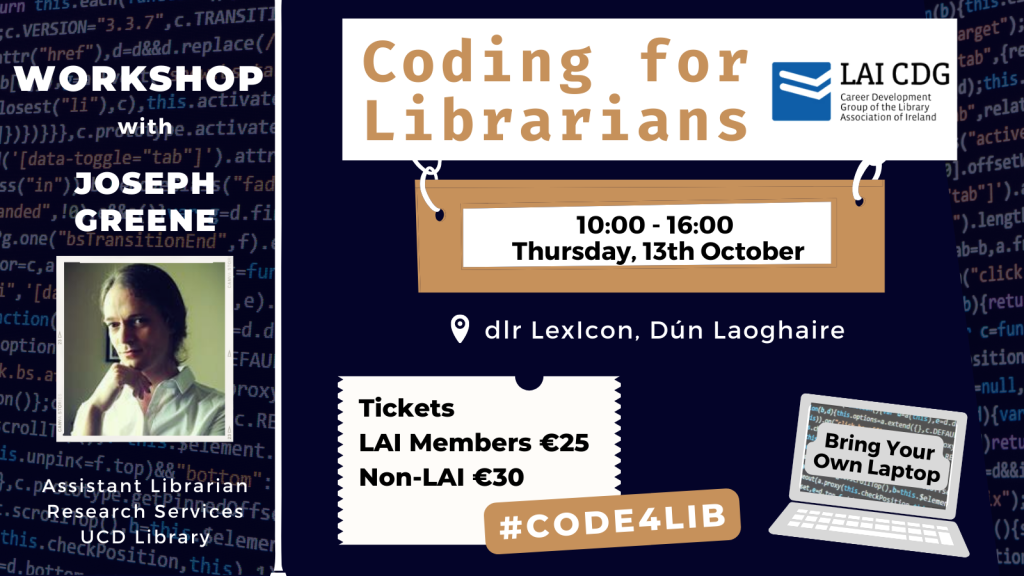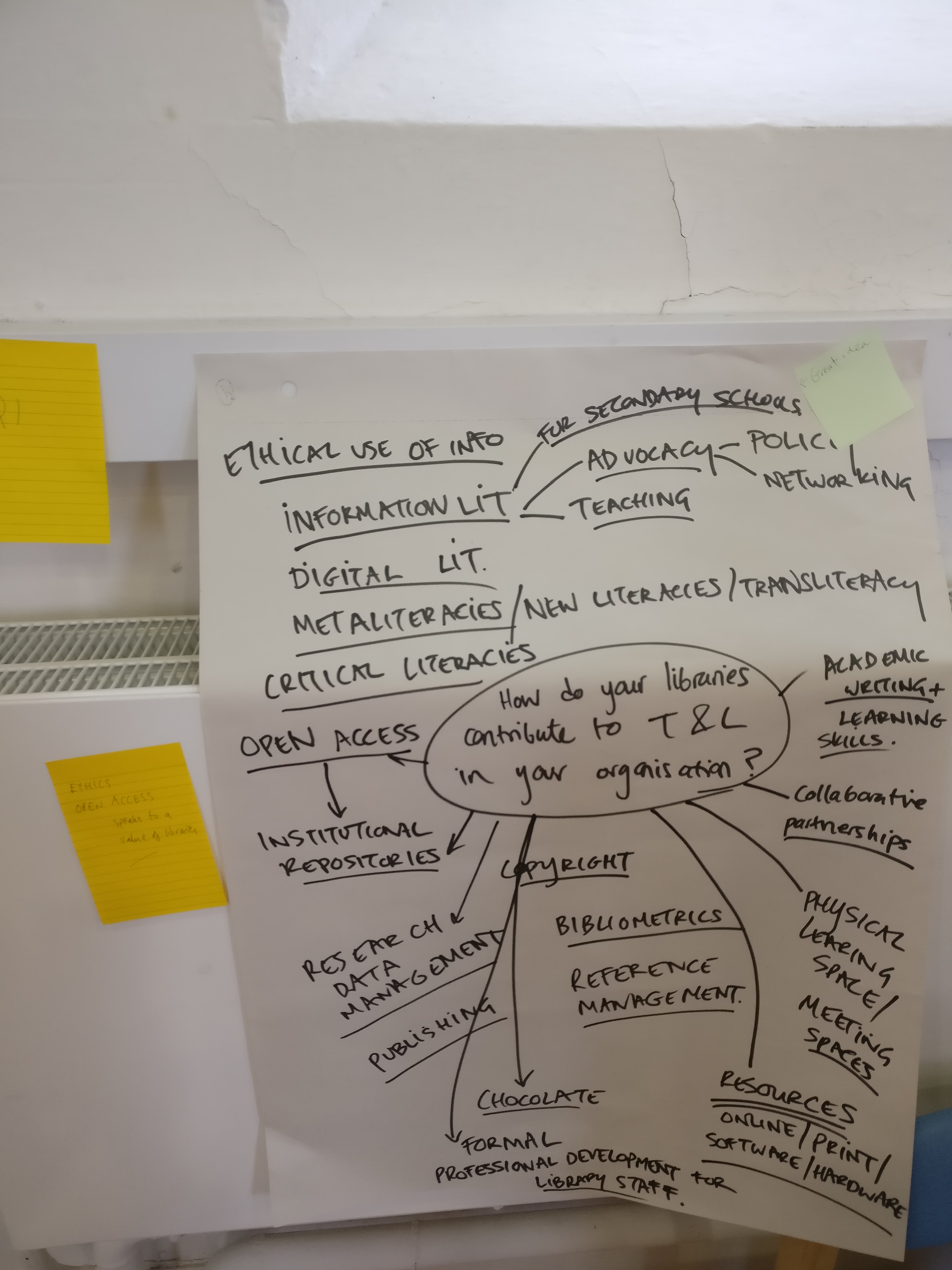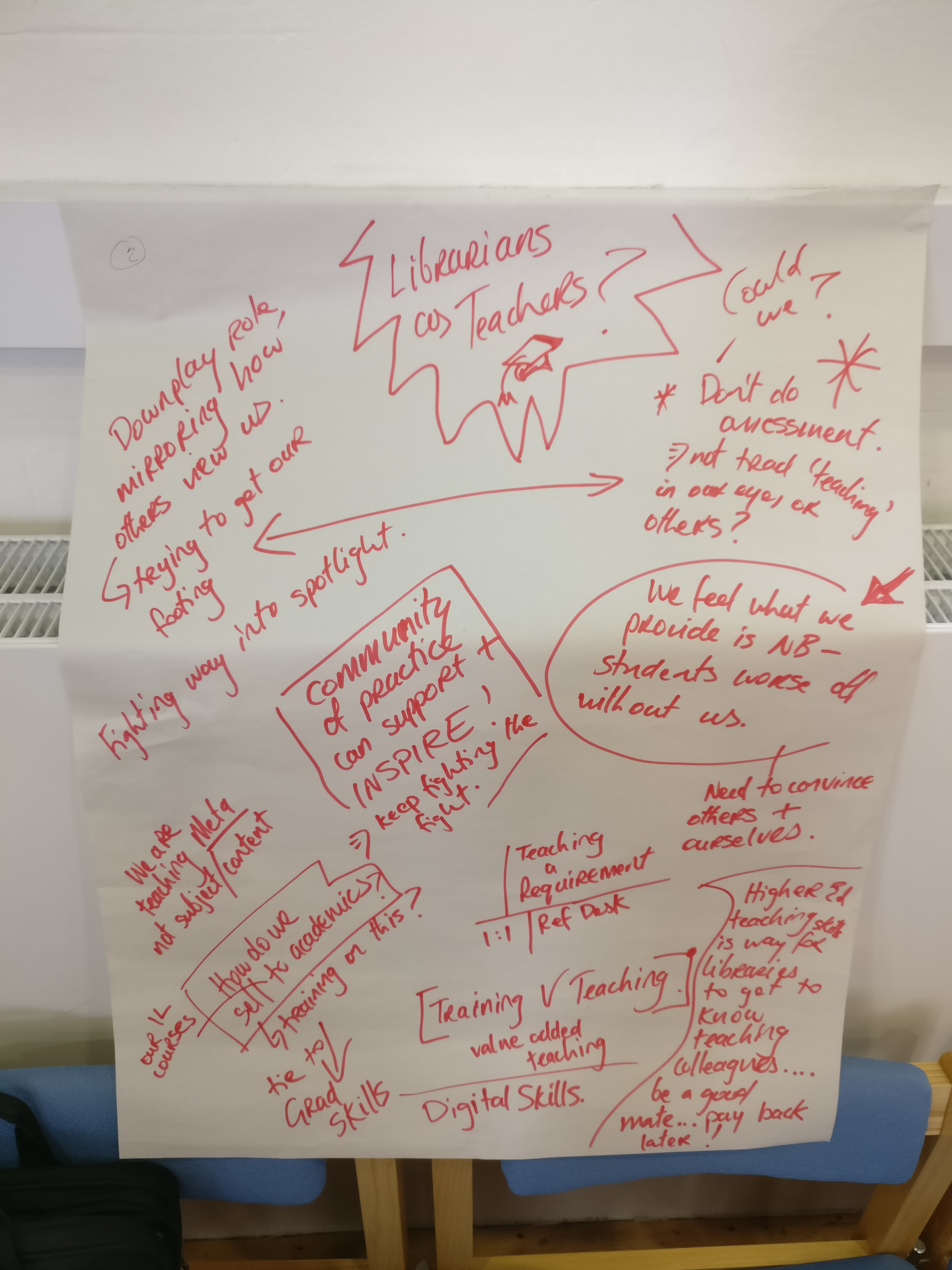The last of our series of blog-posts ties together the visions of leadership in Irish libraries presented by our inspiring speakers at Lead to Succeed and is written by CDG Chairperson Marta Bustillo.
This year’s annual seminar and AGM of the Career Development Group sought to present a variety of views on leadership from librarians at all career stages, as well as from non-librarians. We invited John Lonergan, former Governor of Mountjoy prison, as our keynote speaker and we also had Kate Kelly, head librarian at RCSI; Siobhan McGuinness, 2016 winner of the Career Advancement Award from the Special Library Association’s Leadership & Management Division; Hugh Murphy, Senior Librarian at the Collection Management Division in Maynooth University Library, and Marie O’Neill, head of library services at Dublin Business School. All of them came at the issue of leadership from very different angles, yet a number of common themes seemed to emerge from all of the talks, which I would like to reflect upon in this post (slides available at links above & on our Slideshare).
At a time when even the need for libraries is being put in question, and when library staff are increasingly being replaced by so-called ‘open libraries’, effective leadership will make the difference between a thriving and well funded library, or no library at all.
 Hugh Murphy asked: “a leader of whom? In what?” These are unequivocally the core questions we should ask of ourselves and of our profession. If we want libraries to flourish and play a central role in society, we must provide visionary leadership that can demonstrate the value and relevance for the future of what libraries offer and what librarians are trained to do. However as Marie O’Neill highlighted, where are our role models for leadership? Do we know sufficiently about the history of our profession to understand who our leaders were, and what they contributed to the world as we know it now? How many working librarians can actually name the founders of our profession and why what they did was important?
Hugh Murphy asked: “a leader of whom? In what?” These are unequivocally the core questions we should ask of ourselves and of our profession. If we want libraries to flourish and play a central role in society, we must provide visionary leadership that can demonstrate the value and relevance for the future of what libraries offer and what librarians are trained to do. However as Marie O’Neill highlighted, where are our role models for leadership? Do we know sufficiently about the history of our profession to understand who our leaders were, and what they contributed to the world as we know it now? How many working librarians can actually name the founders of our profession and why what they did was important?
As a profession, we have remarkably little knowledge of our own history, of our own successes, and find it particularly difficult to adopt a style of leadership that works for ourselves and for our institutions. This of course could change if, as Marie suggested, we introduced modules on the history of our profession and on developing leadership into the LIS curriculum. Nevertheless, we would probably still come up against what could be considered as character traits of librarians: the unwillingness to ‘blow our own trumpet’ and the preference for keeping a low profile. As Kate Kelly highlighted in her talk, the ‘vision thing’ is difficult to achieve, particularly, it seems, for women, in a profession predominantly populated by women. It requires influencing and persuading ‘up, down and sideways’, something that librarians are rarely trained to do.
Responsibility, integrity and vision
 John Lonergan defined leadership very clearly when he said that it is about taking responsibility for everything that happens in an organisation. It requires integrity, vision, the ability to get the best out of others and the humility to acknowledge mistakes. Without integrity, nothing else will work because staff won’t know what is true, what is expected of them and whether leaders can be trusted to stand by them when things get difficult. Without vision, staff won’t be enthused about their work and will not contribute their most creative ideas. Leaders must be committed to getting the best out of others, fostering an equal and respectful atmosphere at work, making good use of the expertise that staff bring to their positions, recognising the achievements of their employees and investing in their personal and professional development. When they fail to do so, this translates into high staff turnover and losses for their organisations. Finally, leaders must have the humility to acknowledge mistakes in order to foster a trusting relationship with employees, one which encourages staff to report the failures as well as the successes, and to try even when they may fail.
John Lonergan defined leadership very clearly when he said that it is about taking responsibility for everything that happens in an organisation. It requires integrity, vision, the ability to get the best out of others and the humility to acknowledge mistakes. Without integrity, nothing else will work because staff won’t know what is true, what is expected of them and whether leaders can be trusted to stand by them when things get difficult. Without vision, staff won’t be enthused about their work and will not contribute their most creative ideas. Leaders must be committed to getting the best out of others, fostering an equal and respectful atmosphere at work, making good use of the expertise that staff bring to their positions, recognising the achievements of their employees and investing in their personal and professional development. When they fail to do so, this translates into high staff turnover and losses for their organisations. Finally, leaders must have the humility to acknowledge mistakes in order to foster a trusting relationship with employees, one which encourages staff to report the failures as well as the successes, and to try even when they may fail.
Ultimately, as Hugh Murphy pointed out, managers choose whether to be leaders or ‘power mongers’. One possible way of ensuring that leaders get the best out of their staff is by applying the concept of Appreciative Inquiry, defined as a system that ‘advocates collective inquiry into the best of what is, in order to imagine what could be, followed by collective design of a desired future state that is compelling and thus, does not require the use of incentives, coercion or persuasion for planned change to occur.’[1]
The CDG’s seminar was meant to start a conversation about leadership in Irish libraries, and certainly our five speakers achieved this very successfully. Now the question is where we go from here: what do we need to do in order to encourage leadership at all levels, to train leaders and to foster a culture of leadership in our libraries?
Watch this space – we hope to organise more events in the future that explore the concept of leadership and train future leaders.
[1] Bushe, G. R. (2013). Kessler, E., ed. ‘The Appreciative Inquiry Model.’ The Encyclopedia of Management Theory. Sage Publications.











 Hugh Murphy asked: “a leader of whom? In what?” These are unequivocally the core questions we should ask of ourselves and of our profession. If we want libraries to flourish and play a central role in society, we must provide visionary leadership that can demonstrate the value and relevance for the future of what libraries offer and what librarians are trained to do. However as Marie O’Neill highlighted, where are our role models for leadership? Do we know sufficiently about the history of our profession to understand who our leaders were, and what they contributed to the world as we know it now? How many working librarians can actually name the founders of our profession and why what they did was important?
Hugh Murphy asked: “a leader of whom? In what?” These are unequivocally the core questions we should ask of ourselves and of our profession. If we want libraries to flourish and play a central role in society, we must provide visionary leadership that can demonstrate the value and relevance for the future of what libraries offer and what librarians are trained to do. However as Marie O’Neill highlighted, where are our role models for leadership? Do we know sufficiently about the history of our profession to understand who our leaders were, and what they contributed to the world as we know it now? How many working librarians can actually name the founders of our profession and why what they did was important? John Lonergan defined leadership very clearly when he said that it is about taking responsibility for everything that happens in an organisation. It requires integrity, vision, the ability to get the best out of others and the humility to acknowledge mistakes. Without integrity, nothing else will work because staff won’t know what is true, what is expected of them and whether leaders can be trusted to stand by them when things get difficult. Without vision, staff won’t be enthused about their work and will not contribute their most creative ideas. Leaders must be committed to getting the best out of others, fostering an equal and respectful atmosphere at work, making good use of the expertise that staff bring to their positions, recognising the achievements of their employees and investing in their personal and professional development. When they fail to do so, this translates into high staff turnover and losses for their organisations. Finally, leaders must have the humility to acknowledge mistakes in order to foster a trusting relationship with employees, one which encourages staff to report the failures as well as the successes, and to try even when they may fail.
John Lonergan defined leadership very clearly when he said that it is about taking responsibility for everything that happens in an organisation. It requires integrity, vision, the ability to get the best out of others and the humility to acknowledge mistakes. Without integrity, nothing else will work because staff won’t know what is true, what is expected of them and whether leaders can be trusted to stand by them when things get difficult. Without vision, staff won’t be enthused about their work and will not contribute their most creative ideas. Leaders must be committed to getting the best out of others, fostering an equal and respectful atmosphere at work, making good use of the expertise that staff bring to their positions, recognising the achievements of their employees and investing in their personal and professional development. When they fail to do so, this translates into high staff turnover and losses for their organisations. Finally, leaders must have the humility to acknowledge mistakes in order to foster a trusting relationship with employees, one which encourages staff to report the failures as well as the successes, and to try even when they may fail.

 After a short break…
After a short break…
 The ever engaging
The ever engaging